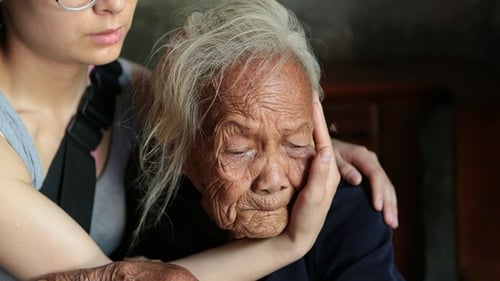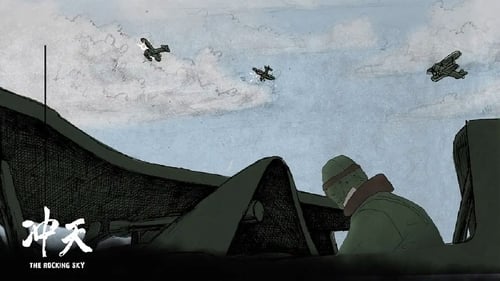JUST IN TIME (2019)
장르 : 드라마
상영시간 : 29분
연출 : Colin Huang
시놉시스
Andy is a novelist who works from home. One day, a girl mysteriously appears in his toilet. She claims to be from the future and needs his help. Her name is Pomegranate.

A highway is waiting to go through a quiet village in Hunan, a province in central China where Mao was from. Due to the high cost of construction, construction companies and migrant workers who live on road work rush to here like the tide. In the following four years, they root in this strange place for interests, paying sweat and blood, even their lives. With their arrival, local village and peasants are forced to change their lives. Many hidden interest lines and hidden rules about road construction of the nation are unveiled, together with the shocking truth and emerging secrets.

China marks the beginning of the extensive Asian theme in Ottinger’s filmography and is her first travelogue. Her observant eye is interested in anything from Sichuan opera and the Beijing Film Studio to the production of candy and sounds of bicycle bells.

Set in a quasi-ghost town that once thrived with oil in China's arid northwest, Yumen is a haunting, fragmented tale of hungry souls, restless youth, a wandering artist and a lonely woman, all searching for human connection among the town's crumbling landscape. One part "ruin porn", one part "ghost story”, and entirely shot on 16mm, the film brings together performance art, narrative gesture, and social realism not only to play with convention and defy genre, but also to pay homage to a disappearing life-world and a fading medium.

A soon-to-be first-time voter, the filmmaker’s thought-provoking journey into the Rust Belt and South captures four Asian American voters’ ardent first time grassroots political participation ignited by the 2016 rise of “Chinese Americans for Trump.” FIRST VOTE is a character driven cinema verité style film chronicling the democratic participation of four Asian American voters from 2016 through the 2018 midterm elections.

황샤오유의 가족은 오랜기간동안 위기를 겪고 있다. 동성애자로 밝혀진 아버지와 신경질적인 어머니가 아슬아슬한 결혼생활을 유지하고 있기 때문이다. 그러나 프랑스인과 결혼 후 임신 6개월차에 접어든 황샤오유가 친정으로 돌아오며 가족의 위기가 더욱 심해지기 시작한다.

철도 위에서 3년 이상 촬영하면서 빛과 어둠, 언어와 제스처가 교차하며 변화하는 중국의 내면을 담았다. 추상회화를 연상케 하는 프레임을 통해 인간과 기계의 만남을 묘사한다. 기차의 일상과 인간을 추상적 이미지로 조형한 에세이 필름. (2015년 제16회 전주국제영화제) 리뷰 3년의 시간 동안 중국의 원근각지를 이동하는 철도의 이모저모를 편집하여 만든 에세이 다큐멘터리이다. 철로, 곤히 잠자는 사람들, 콩나물시루 같은 기차의 낭하, 좁은 통로에서 담배를 피우는 사람들은 중국 사회의 빛과 그림자를 무연히 은유한다. J. P 스니아데키 감독은 추상회화를 연상케 하는 회화적인 프레임 구성을 즐겨 사용한다. 순간순간 카메라의 존재를 드러나거나 카메라 뒤에 있는 자신을 드러내기도 한다. 육중한 철의 질감, 비곗덩어리, 핏물이 흐르는 내장 등의 오브제들을 활용하면서 그는 빈 라덴이나 카다피와 모택동을 비교하는 중국 사람들의 이야기를 슬쩍 끼워 넣음으로써 사회학과 문화인류학을 오간다. 슬금슬금 옆걸음질 치며 잠행하는 카메라는 영화의 말미에 쾌적한 상 등급 고속열차로 점핑한다. 철도, 기차의 일상, 인간을 추상적인 이미지로 조형해낸 이 에세이 필름은 사물을 응시하는 밝은 눈을 지닌 예술가의 노력에 의해 탄생했다. 2014년 「필름코멘트」가 선정한 10대 영화에 이름을 올렸다. (2015년 제16회 전주국제영화제/장병원)

마이키앙은 등대에서 일하는 30세 전후의 노총각이다. 외롭고 단조로운 생활속에 그는 꿈속에서 종종 첸킹이라는 여자를 만난다. 호텔에서 일하는 첸은 서른도 못되어 남편을 잃고 자신의 아들 과 함께 불운한 삶을 사는 여자다. 어느날 두사람은 만나게 되고 마이는 첸에게 자신과 관계를 맺을 것을 강요한다. 첸이 울자 마이는 심한 자책감을 느낀다. 호텔 지배인 모아저씨는 첸이 강간 당했다고 믿고 마이를 고소한다. 마이는 감옥에 갇히는데 나중에 첸이 강간이 아니라고 증언을 하여 마이는 석방된다. 첸은 세간의 입놀림의 표적이 되고, 그 사실을 알게된 마이는 첸을 찾아간다.

중국 지역 일본군 ‘위안부’ 피해자 20만 명 2014년 촬영 당시 생존자 단 22명 그 22명의 할머니들이 들려주는 마지막 이야기 그리고… 2018년 8월 현재 중국에 남아 있는 ‘위안부’ 피해자는 단 6명 할머니들 대부분은 90세를 넘겨 삶의 끝자락에 서 있다.

Xingxi travels alone to Alor Setar, a town in Northern Malaysia. As a consequence of a blown tire, she experiences three variant adventures. She introduces herself to people using different identities with mysterious secrets. In return, what the journey brings her is thoroughly unexpected. In the first adventure, Brooke is a traveler; in the second adventure, Brooke is an anthropologist; in the third, Brooke is a divorcée. She is a disheartened woman who comes across a French writer named Pierre. The two lonely travelers become instant friends. Their age gap enables them to have their respective insights into life and death. Meanwhile, it is not until the enigmatic side of Alor Setar begins to unfold that Brooke tells Pierre the true reason why she has come. They seek to understand the interaction between love and life. As the story comes to an end, mother nature shows her beauty with the magical Blue Tears phenomenon on prominent display.

Before the Flood is a study of the final weeks of a dying city, as thousand-year-old Fengjie on the Yangtze River is reduced to rubble and its inhabitants uprooted to make way for the new Three Gorges Dam that will flood the entire valley.

A documentary chronicling the coming of age of a young chinese man.

To commemorate the 70th anniversary of the victory of WWII, this documentary film describes the eight years of dauntless air-force fighting of the republic of China during the Anti-Japanese War, with only 300 combat-capable aircraft from China while Japan had over 2000.

Class 172 is a key class for their excellent students of an ordinary secondary school in Hunan province, from which the kids’ main goal is to upgrade into one of the best province-level high school – No.1 high school of the county. In the recent few years, the school’s enrollment rate to high school was not quite satisfying, and this year, the newly promoted class in charge teacher – Mr. Xiang, who’s only graduated a few years ago, became their brightest hope to teach the students and raise the enrollment rate for school.

This important, patient documentary follows a year in the life of the sidings dwellers who eke out a living, begging, foraging, stealing and sleeping rough near the Baoji railway station in Shaanxi.

Xu Xin’s film “Dao Lu” (China 2012) offers an exclusive “in camera” encounter with Zheng Yan, an 83 year-old veteran of the Chinese Red Army, who calmly relates how he has navigated his country’s turbulent history over three-quarters of a century.Born to a wealthy family in a foreign concession, Yan joined the Chinese Communist Party (CCP) in 1941 because he sincerely believed in the socialist project, and in its immediate capacity to free China from the Japanese yoke and eradicate deep-rooted corruption.


A Yangtze Landscape utilizes a non-narrative style, setting off from the Yangtze's marine port Shanghai, filming all the way to the Yangtze River's source, Qinghai/Tibet - filming a total distance of thousands of kilometers. Experimental music and noise recorded live on scene are used in post-production, painstakingly paired with relatively independent visuals, creating a magically realistic atmosphere contrasted with people seeming to be 'decorative figures' right out of traditional Chinese landscape scrolls.

Workers, peasants, soldiers, students and merchants were five groups of Chinese society in the 1950s, after the so-called elimination of the exploited class. Borrowing this concept, the umbrella is taken as the clue to rediscover changes in various social classes after the economic reform, and to analyze the social problems in China. Workers making umbrellas, merchants selling umbrellas, students looking for jobs in the rain. Umbrella is used as a metaphor that can be seen everywhere. As the raindrop, what we see is sometimes clear, sometimes untraceable.

Jiang Xue, a well-known investigative journalist, began an in-depth investigation into the political injustice that happened in his hometown nearly half a century ago. "Xue‘s investigation" was one of Jiang Xue's main self-media at the time, but it was suspended in a short period of time because of the depth and sharpness of the work and the courage to reveal the truth of the incident. During the filming by Jiang Xue, the video version of "Snow Visit" produced by Tiger Temple was only made in the first phase of the film and one person (Xiang Chengjian) died prematurely, making it a precious historical film.

Zhang and Shanni are a couple. They live in Beijing and both are successful. Zhang is a director of some renown whose film has just won a prize abroad. Shanni is a fashion magazine photographer from Guangdong. They planned to get a marriage certificate quickly and start a wedding trip. However, their parents are not keen on the idea and insist on a traditional Chinese wedding. They force the couple to organize a traditional ceremony. Everyone comes to Zhang's hometown of Shanxi, and a family hell begins. Differences of opinion between the young couple and the parents, cultural differences between the two families, and then Zhang's ex-girlfriend turns up - A truly black comedy.

Three scenes about three couples with each portraying maybe the turning point of their relationship. First scene, Lim & Amelia are a couple who had been together for almost five years. While he works as a salesman and trying to save up for marriage, the girl are not sure if he’s the one she wants to marry. One day he confronts her about a letter from her admirer. Second scene, Pete & Bernice are a couple who had been together almost ten years. They’re not married because he doesn’t believe in marriage. While she tags along, one day she might realizes this may not be the man she wants to end up with. Third scene, we see Amy & Lai are a pair of secret lovers. This maybe their last meeting or maybe not. They may had loved each other in the past they may not now in this scene. This is the third and final part of James Lee's Love Trilogy which takes offers a glimpse of the life of three lovers.

In 1978 Deng Xiaoping set up Shenzhen as a Special Economic Zone in China, and this decision led to the rapid development of Guangdong economy. Numerous factories have been established, millions of people are attracted because of gold rush. Over 30 years later, young people who were away from their home have already stepped in the midlife. Guangdong has become a representative of job hunting and has been drawing a newly young generation who has faith and uncertainty to the future. This video revolves around three working-class boys who are the 90s generation.

The year 2003 is a rather turbulent period for Hong Kong – the economy was in recession, the government constantly implemented futile policies, the SARS outbreak, and, on July 1st, 500,000 people went on strike opposing the adoption of Article 23 of the Basic Law. It was against this political atmosphere that YIN Zhao-Jian gave up his social worker job, a 10 year long and steady career, and joined the political circle and participated in the district councilor election, which he had no idea about.











